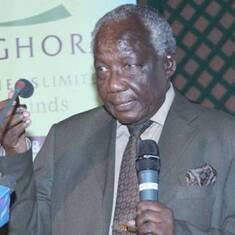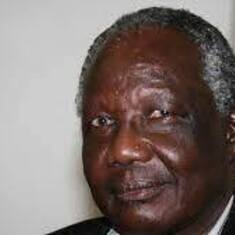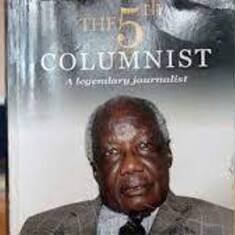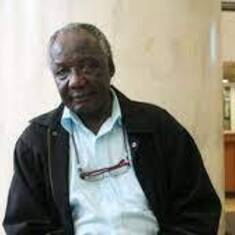Day Philip Ochieng saved me from Moi
May 5, 2021
by Martin Masai
I first came face to face with veteran journalist Phillip Ochieng in 1988. At the time, I worked as the Machakos Correspondent for the Nation newspaper. My chance encounter with PO, as he was commonly referred to, happened during one of my rare visits to Nation House, to perform the monthly ritual of confirming – in centimetres, believe it or not – the length of stories that would make up my paycheck.
Waltzing across the newsroom, PO found me chatting with News Editor Joseph Karimi, when he shot: “Who are you and what are you doing here?” Karimi came to my rescue, telling PO who I was. PO shot back. ” Stop idling here,’’ he said matter-of-factly. ‘‘Go back to Machakos and send the good stories you have been filing.”
As I began walking out, PO burst into a laugh, telling me not to be so easily scared. He then walked away, leaving Karimi and I to our devices. Karimi assured me that picking on young reporters was PO’s style and that the man meant no harm.
After working with the Nation and failing to secure a permanent job with the newspaper, I quit and joined Pius Nyamora, the other veteran who was launching The Society Magazine, a monthly. I went in as a Senior Reporter. That could have ideally marked the end of my direct interactions with PO, but that wasn’t to be.
One day, as I was sourcing for photos at Kenya Times – the state owned paper had a comprehensive reservoir of material – I walked to the Editor-in-Chief’s office to seek authority to buy the images when I bumped into PO. After explaining my mission at Kenya Times, PO asked me why I had opted to join a monthly publication instead of reporting for a daily newspaper as I had become accustomed to. Before he could hear my side of the story, PO reached for the phone on his desk and dialled a number. I later learnt he was speaking to my boss at Society Magazine, Mr Pius Nyamora.
“I want to give this boy a job and send him back to Machakos,” PO told him.
As PO approved the request to purchase pictures, he handed back the requisition.
“Come back at 2pm for your letter of appointment,” PO said. “I want you back in Machakos to continue your good work.”
I dashed back to the magazine’s offices in Tumaini House with pictures in my hand, where Nyamora informed me of his conversation with Mr Ochieng. Nyamora congratulated me for finding a more active job and bade me farewell. That afternoon, I was appointed the Kenya Times Staff Correspondent in Machakos, setting me up for a monumental confrontation with the behemoth that was KANU and its leaders as the struggle for Kenya’s second liberation peaked.
At the height of the KANU rule, party stalwarts were running amok, grabbing all available and unavailable land while KANU-nizing everything along their path. At around the time of my Kenya Times debut, politicians, together with top civil servants, had grabbed hundreds of acres of land formerly owned by Brookbond Limited in Kibwezi.
The backstory of the land was that the government had acquired it and renamed it the Masongaleni Settlement Scheme, with the intention of resettling squatters who had been evicted from Kyulu Hills and Kalembwani, where Maasai and Kamba villagers had clashed historically. The squatters needed one acre each to resettle them, but politicians moved in and allocated themselves vast tracts of land to the exclusion of settlers. This land grab by the well connected set off a media campaign which called for the reversal of all the allocations.
Understanding what the squatters stood to lose, I took the lead in the fight, knowing the underlying risks because I was employed by the ruling party newspaper- The Kenya Times.
Occasionally, as I filed stories over the telephone, the News Editor, Chris Musyoka, would convey encouragement messages from the Editor-in-Chief, Philip Ochieng, on how I handled the developing story coupled with guidance on the elements to pursue. I noticed the significance of the beat as it was sometimes published on page one. It dominated the daily press for nearly one month until the government acted.
After the land allocations were cancelled, Mulu Mutisya and Kalonzo Musyoka, two Ukambani political heavyweights who had allegedly benefited from the allocations, are said to have visited the then President Daniel Arap Moi to launch a complaint that Kenya Times had deployed a Nyangau in Machakos to undermine KANU and promote multi-party politics.
Moi was easily convinced and put a call to Philip Ochieng to fire me from The Kenya Times.
PO instructed that I leave my station at once and meet him at the office.
It was 4pm. I went to my house to pick some clothes but found KANU youth wingers were already conducting a drill in my compound. I abandoned the quest for additional clothes before the young men spotted me and went straight to the office in Nairobi.
Upon arriving, Mr Ochieng paraded me before Managing Editor Amboka Andere. Pointing at an imposing portrait of President Moi, Ochieng thundered, ” This man has told me to sack you. Do you want me to sack you? What have you done to Mulu Mutisya?”
As I explained that I was only doing my job, the Editor-in-Chief interrupted, “I have told him to sack me first. Thank God that this is not your mother’s newspaper. You have done a good job in Machakos but you must get into the cold storage for two months for things to cool off.”
Martin Masai – my byline – vanished, and in came Ndei Malasi.
And just like that, PO stood between Moi and me and saved me from losing my job. I used the new byline until the repeal of Section 2A which reintroduced multiparty politics in Kenya. That’s when Martin Masai re-appeared.
What stood out for me when working under PO was his great courage to face Moi when KANU was drunk with power. PO stood for the critical values of journalism and was willing to take the bullet and save his reporters as long as they complied with ethical and professional standards.
Much as he was accused of defending KANU, PO objected to the actions of party functionaries and published stories critical to their actions. The loudest of his criticisms being his dismissal of MPs, the majority of them from KANU, as having brains the size of a pinhead.
During that time, PO published a daily roll-call of MPs to whip them to attend parliamentary sessions that were faced with endless quorum hitches. No other editor in Kenya has exhibited such courage in my 38 years as a journalist.
Whether in a suit or informal, PO was always dressed sharply and wore strong designer perfumes whose fragrance wafted through the corridors of the Kingsway House offices as soon as he entered the building.
Without an iota of doubt, I can say that without PO, even when we were not friends or peers, my career and those of many others would not be worth anything.
PO defended the length and breadth of journalism at a time when doing so was treasonable
Years later, using lessons learned from him and those he natured, I rose through rank and file and exited the dailies at the level of Managing Editor.
May his soul Rest in Peace.
*Martin Masai is the editorial director, Mbaitu FM, and a trustee at the Kenya Editors Guild.*
This story was first published by Debunk Media.https://debunk.media/how-philip-ochieng-saved-me-from-moi/





